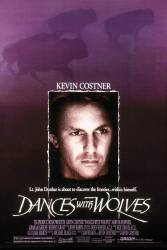Continuity mistake: When Kevin Costner gets hit on the head by the top frame of the door, he is knocked out unconscious. Yet, when he gets back up after regaining consciousness, the blood from is head had been running down his nose. Don't you think that as he was lying down in a horizontal position, the blood would run down over the eyes towards the ears?

Dances with Wolves (1990)
2 reviews
Directed by: Kevin Costner
Starring: Kevin Costner, Mary McDonnell, Graham Greene, Rodney A. Grant
Your rating
Average rating
(21 votes)
The best movie ever made.
The best movie ever made.
John Dunbar: The strangeness of this life cannot be measured: in trying to produce my own death, I was elevated to the status of a living hero.
Trivia: For his portrait of the Indians (which was radically different from all the earlier movies), Costner was made an honorary tribe member of the real-life Sioux.
Question: Why did Dunbar's superior kill himself as Dunbar was being taken to his new post?
Answer: Dunbar's superior supported the British ("The King is dead... Long live the King" said with a heavy British accent) and was likely a closet-case Redcoat his entire US military career. It was not rare and many suicides were a result of that.
This claim is not supported by the movie. "The King is dead. Long live the King" is a common idiom referring to the passing of power to someone new. It most definitely does not literally refer to the English King. The movie is set in the middle of Queen Victoria's reign. As for your assertion that there were a large number of English loyalists in the Union Army three generations after the Revolutionary War seems highly unlikely. Can you cite evidence of this?
Join the mailing list
Separate from membership, this is to get updates about mistakes in recent releases. Addresses are not passed on to any third party, and are used solely for direct communication from this site. You can unsubscribe at any time.
Check out the mistake & trivia books, on Kindle and in paperback.




Answer: He was mentally disturbed and was depressed about being assigned to a "dead end" post with no chance at advancement. Dunbar, the hero, choosing to be assigned to the frontier, just pushed the poor soul over the edge.
Mark English
In a word, the disease syphilis. The urinary tract problems and the Insanity are possible side effects.
What are you basing this on? What in the movie indicates that he has syphilis?